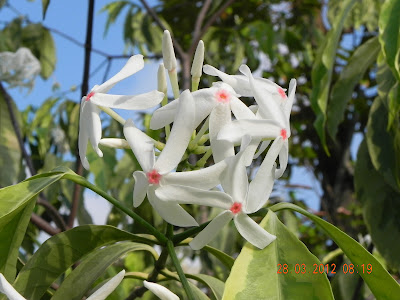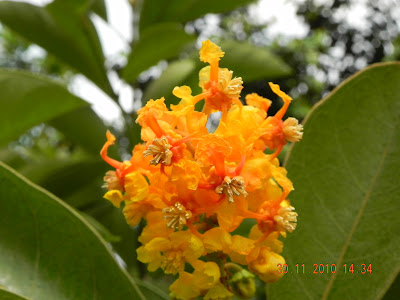The Four O'clock flower comes in a variety of colours and I must say I love the orange colour.
Showing posts with label orange. Show all posts
Showing posts with label orange. Show all posts
06 October 2014
15 July 2014
03 April 2014
FIRMIANA MALAYANA
27 December 2013
PEACOCK PANSY
I chanced upon this orange beauty at the Marina Barrage end of the Satay by the Bay car park entrance. In comparison, I haven't seen the Blue Pansy in a long while.
01 May 2013
ORANGE
The climber Passiflora growing on the Fruits and Flowers trellis have been fruiting for some time now.
Then there is the orange-flower bare crown Firmiana malayana (Common Name: Bullock's Eye, Mata Lembu; Family: Sterculiaceae) tree at the courtyard of the Indian Garden. Unfortunately, I didn't manage to go back to take the fully opened flowers.
Then there is the orange-flower bare crown Firmiana malayana (Common Name: Bullock's Eye, Mata Lembu; Family: Sterculiaceae) tree at the courtyard of the Indian Garden. Unfortunately, I didn't manage to go back to take the fully opened flowers.
Labels:
climber,
firmiana,
fruits and flowers,
indian,
orange,
passiflora,
sterculiaceae
21 December 2012
03 April 2012
FLOWERS & FRUIT
This is a post on some beautiful flowers.
The first is on the relatively common Dendrobium crumenatum (common name: Pigeon Orchid) planted on some of our roadside trees. Just look at the abundant miniature pigeons on the tree. The stimulus for flowering is actually rather similar to that for the Rain Lily. A dry spell followed by rain is all it needs to get it to flower! Sadly, the small virginal white lightly fragrant flowers last only a day. Sometimes, it is true that beautiful things are short-lived.
Then there is the variegated Kopsia with Periwinkle-like flowers, or so I was told. Even though I grew one of this at HortPark previously, I never saw the flowers until recently.
There is the amazingly showy Costus curvibracteatus with the shade of green and orange that I so love! Oh, I just love to eat the juicy orange flowers too and the presence of ants tell me it is safe for consumption. Unfortunately, it can sometimes be a fussy plant that requires tender, loving care. But when it is happy and grown under optimum conditions, it rewards the grower with an abundance of beautiful head of orange bracts and flowers.
At the same time, it was the flowering and fruiting season for the Synsepalum dulcificum (common name: Miracle Fruit, Miracle Berry; Family: Sapotaceae), as observed by the abundant red ripe edible fruits. It was mentioned in the newspapers recently that the fruits were imported from overseas and sold for about $63 for a packet of 100 fruits. Wow, it is really a surprise how much the fruits are valued literally. The chemical compounds present in the fruit temporarily alter the sensitivity of the taste buds so that all sour fruits ingested after eating this miraculous fruit taste sweet. The effect lasts for about two hours, so do not try to eat this fruit before a meal. I was told that a colleague mentioned that a crab he ate at lunch tasted sweet instead of the original taste.
Finally, the two Alpinia plants were competing for my attention with its clusters of brilliant flowers.

The first is on the relatively common Dendrobium crumenatum (common name: Pigeon Orchid) planted on some of our roadside trees. Just look at the abundant miniature pigeons on the tree. The stimulus for flowering is actually rather similar to that for the Rain Lily. A dry spell followed by rain is all it needs to get it to flower! Sadly, the small virginal white lightly fragrant flowers last only a day. Sometimes, it is true that beautiful things are short-lived.
Then there is the variegated Kopsia with Periwinkle-like flowers, or so I was told. Even though I grew one of this at HortPark previously, I never saw the flowers until recently.
There is the amazingly showy Costus curvibracteatus with the shade of green and orange that I so love! Oh, I just love to eat the juicy orange flowers too and the presence of ants tell me it is safe for consumption. Unfortunately, it can sometimes be a fussy plant that requires tender, loving care. But when it is happy and grown under optimum conditions, it rewards the grower with an abundance of beautiful head of orange bracts and flowers.
At the same time, it was the flowering and fruiting season for the Synsepalum dulcificum (common name: Miracle Fruit, Miracle Berry; Family: Sapotaceae), as observed by the abundant red ripe edible fruits. It was mentioned in the newspapers recently that the fruits were imported from overseas and sold for about $63 for a packet of 100 fruits. Wow, it is really a surprise how much the fruits are valued literally. The chemical compounds present in the fruit temporarily alter the sensitivity of the taste buds so that all sour fruits ingested after eating this miraculous fruit taste sweet. The effect lasts for about two hours, so do not try to eat this fruit before a meal. I was told that a colleague mentioned that a crab he ate at lunch tasted sweet instead of the original taste.
Finally, the two Alpinia plants were competing for my attention with its clusters of brilliant flowers.

Labels:
alpinia,
berry,
costus,
dendrobium,
flower,
hortpark,
kopsia,
miracle,
orange,
orchid,
periwinkle,
pigeon,
synsepalum,
variegated,
white
05 December 2010
BYRSONIMA CRASSIFOLIA (HBK.)
Subscribe to:
Posts (Atom)






















































